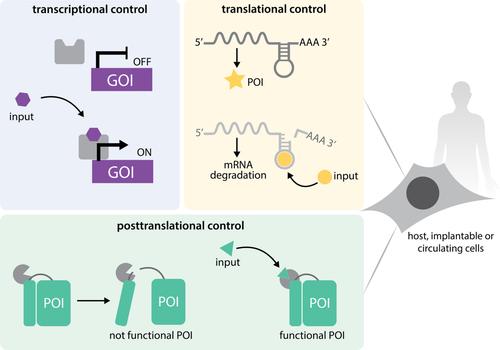当前位置:
X-MOL 学术
›
Biotechnol. Bioeng.
›
论文详情
Our official English website, www.x-mol.net, welcomes your feedback! (Note: you will need to create a separate account there.)
Enhancing cell-based therapies with synthetic gene circuits responsive to molecular stimuli
Biotechnology and Bioengineering ( IF 3.5 ) Pub Date : 2024-06-12 , DOI: 10.1002/bit.28770 Silvia Galvan 1 , Ana P Teixeira 1 , Martin Fussenegger 1, 2
Biotechnology and Bioengineering ( IF 3.5 ) Pub Date : 2024-06-12 , DOI: 10.1002/bit.28770 Silvia Galvan 1 , Ana P Teixeira 1 , Martin Fussenegger 1, 2
Affiliation

|
Synthetic biology aims to contribute to the development of next-generation patient-specific cell-based therapies for chronic diseases especially through the construction of sophisticated synthetic gene switches to enhance the safety and spatiotemporal controllability of engineered cells. Indeed, switches that sense and process specific cues, which may be either externally administered triggers or endogenous disease-associated molecules, have emerged as powerful tools for programming and fine-tuning therapeutic outputs. Living engineered cells, often referred to as designer cells, incorporating such switches are delivered to patients either as encapsulated cell implants or by infusion, as in the case of the clinically approved CAR-T cell therapies. Here, we review recent developments in synthetic gene switches responsive to molecular stimuli, spanning regulatory mechanisms acting at the transcriptional, translational, and posttranslational levels. We also discuss current challenges facing clinical translation of cell-based therapies employing these devices.
中文翻译:

通过响应分子刺激的合成基因电路增强基于细胞的疗法
合成生物学旨在促进开发下一代针对慢性疾病的患者特异性细胞疗法,特别是通过构建复杂的合成基因开关来增强工程细胞的安全性和时空可控性。事实上,感知和处理特定线索(可能是外部触发因素或内源性疾病相关分子)的开关已成为编程和微调治疗输出的强大工具。活体工程细胞(通常称为设计细胞)结合了此类开关,以封装细胞植入物或通过输注的方式输送给患者,就像临床批准的 CAR-T 细胞疗法一样。在这里,我们回顾了响应分子刺激的合成基因开关的最新进展,涵盖了转录、翻译和翻译后水平的调控机制。我们还讨论了使用这些设备的细胞疗法临床转化当前面临的挑战。
更新日期:2024-06-13
中文翻译:

通过响应分子刺激的合成基因电路增强基于细胞的疗法
合成生物学旨在促进开发下一代针对慢性疾病的患者特异性细胞疗法,特别是通过构建复杂的合成基因开关来增强工程细胞的安全性和时空可控性。事实上,感知和处理特定线索(可能是外部触发因素或内源性疾病相关分子)的开关已成为编程和微调治疗输出的强大工具。活体工程细胞(通常称为设计细胞)结合了此类开关,以封装细胞植入物或通过输注的方式输送给患者,就像临床批准的 CAR-T 细胞疗法一样。在这里,我们回顾了响应分子刺激的合成基因开关的最新进展,涵盖了转录、翻译和翻译后水平的调控机制。我们还讨论了使用这些设备的细胞疗法临床转化当前面临的挑战。
















































 京公网安备 11010802027423号
京公网安备 11010802027423号